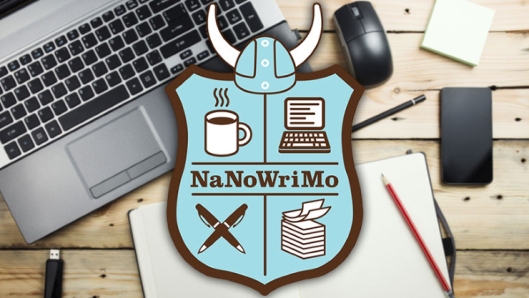Tags
authortoolboxbloghop, first drafts, NaNoWriMo, National Novel Writing Month, writing, writing is hard

After a month’s absence, I’m happy to be back in #AuthorToolboxBlogHop! As always, check out the main link for lots of other fantastic authors (who wrote awesome things in September as well)!
National Novel-Writing Month, aka NaNoWriMo (or just NaNo if you’re me and lazy) is an event that was started 18 years ago by Chris Baty as a way of getting aspiring writers together and helping them actually get some writing done.
The basic concept simple: write 50,000 words in the month of November, and don’t go back and edit anything until you’re done. If you do that, you win. If you don’t, you try again next year.
Ideally, those 50k words should be the beginning of a new project, and that project should be a novel, and you should get to the end of the story by the time you’ve gotten to the end of your words. I always end up breaking at least one of those ideals – usually the one about writing a 50,000-word story instead of writing 50,000 words of a much longer potential story – but it’s useful to keep them in mind. If nothing else, they can give you a sense of what the other WriMos are trying to achieve.
I joined my first NaNoWriMo back in 2007 and failed spectacularly. I didn’t make my next attempt until 2011, but since then I’ve won five out of the six years I’ve participated. (We shall not speak of 2015.) The end results have ranged from pretty decent to absolutely horrible, but I’ve always had fun and I’ve always felt like I learned something from the experience. There’s a sort of a thrill at the end, looking back and seeing what I’ve accomplished – even if that accomplishment is a lot of bad writing.
That having been said, NaNoWriMo is definitely not for everybody. It’s kind of grueling, it eats giant chunks of time out of a month that’s already busy with an American national holiday, and if you don’t know too many other people it can feel sort of isolating. Some people find the commandment against editing freeing, and other people find it distracting and prohibitive.
The way that I’ve found I can enjoy this mammoth undertaking year after year is by remembering to just have fun with it and take every rule and bit of advice with a grain of salt. For anyone who’s a little more curious, though, here’s my take on NaNoWriMo.
What It’s Good For

1. Getting Writing Done
At the end of the day, NaNoWriMo is all about sitting down at your computer/desk/armchair/hideout and putting words on pages. Like anything else, writing is a skill that takes practice and discipline and practice and also practice. It’s not easy to sit down every day and make words come out of your brain. You get tired, or busy, or headachy, and the ideas don’t want to come, and it can be really tricky to find the motivation to force them. Having a concrete goal, a daily word count, can make it a lot easier to grit your teeth and push through – plus, winners can to order a special t-shirt and get cool prizes at the end, so you know that your hard work will be rewarded. (I almost always pre-order my winner’s shirt, so then I feel really guilty if I’m tempted to slack off.)
So if you want to write but are struggling with actually making it happen, NaNo can be a really great way to get your butt in gear. There are lots of regional writing events where you can go and write without being distracted by friends and family and the rest of real life; there’s also a twitter account that runs basically 24/7 throughout the entire month, giving prompts and encouraging people to do little sprints together. And if nothing else, seeing so many other people trying to do the same thing you are helps make the whole thing feel a little bit more achievable.
2. Breaking Through Blocks
A pretty common theme in writing communities is that there’s no such thing as inspiration – or at least, that inspiration isn’t what makes a writer. Inspiration is rare and fleeting and inadequate. Learning how to write isn’t nearly as much about learning how to put brilliant ideas into words as it is about learning how to make yourself generate ideas even when they don’t want to appear. The sheer volume of work that NaNo demands comes incredibly handy when it comes to mastering that skill; there is no way to write 1667 words a day every day for 30 days without having something go wrong. You will have off days, you will have days where you have no idea where things are going, where you realize you’ve left a massive plot-hole hanging with no resolution. And if you want to win at NaNo, you’ll also start figuring out how to get a word count anyway – by writing a scene that doesn’t appear in the novel, by writing the scene you know won’t work, by killing someone off dramatically. It might not be elegant – it won’t be elegant – but eventually something will work well enough for you to be able to move on.

3. Escaping the “Perfection” Trap
This ties in a lot with #2 – there’s really no such thing as a good first draft. No matter how brilliant a writer is, their first drafts still look like a bowl of nonsense and mush. If you write, you will write badly; that’s inescapable. NaNoWriMo doesn’t just acknowledge that, it embraces it wholeheartedly. The point of the game is quantity, not quality, and if you want to win you’ll find yourself learning how to move on from a mistake so you don’t tank your word count. Time editing is time not writing, after all, and there will be plenty of time to edit in December. So you have to start confronting the idea that you’re not a perfect writer and learn how to make some kind of peace with that for the sake of moving on. There’s something incredibly liberating about realizing that you don’t have to be perfect the first time around – and it’s great to be able to say “well, NaNo says I can’t edit this month, so I guess I have no other choice”. Let the event do the hard work for you!
4. Finding Resources
One of the things I’ve enjoyed the most about NaNoWriMo is the community. The forums have boards for pretty much every genre, age range, region, and plot hole that you can think of. There are also events hosted in many regions, particularly big cities with accommodating coffee shops, where you can go and meet other WriMos. If you’re stuck on a problem, there’s always somewhere you can post or someone you can ask for help, and the community is filled with people who like trying to provide thoughtful, useful answers. That’s great when you realize you’ve been sitting there for two hours wondering how your hero can dismantle a bomb AND win the dance competition at the same time.
What It’s Not Good For

1. Quality
The flip side of banging out 50,000 words in 30 days is that a lot of them will be bad. If you’re struggling with writing technique, NaNo isn’t going to be very much help to you. The format just isn’t conducive to sitting down and thoughtfully refining your writing process, so it’s not a great use of time for anyone who’s trying to break bad habits, and it can actually be kind of derailing if you’re trying to improve a specific skill like writing dialogue or describing scenery. If you’re the type of person who benefits from writing a chapter and then smoothing out the bumps before moving on to the next one, you may find you have a much harder time when everyone around you is pushing to just get the words out. Slapdash isn’t for everyone.
2. Routine
NaNoWriMo is a sprint. It’s a 30 day rush to a glorious conclusion, with the assumption that you’re going to need to stop and catch your breath for a while. So while it can be an incredibly useful way to start training yourself to sit down and write even though you don’t feel like it, it won’t help you build a sustainable routine. In real life, writers need to be consistent. That means you need to find a system that doesn’t burn you out, that’s compatible with both your writing abilities and your daily life. You can shut out friends and family for a month and laugh it off, but isolating yourself for the entirety of your writing career is not the sort of thing that is healthy for pretty much anyone.
Writers also need to be able to spend time on the parts of the job that don’t contribute to a word count. Research is important, as is problem-solving, as is editing, and all three of those are separate skills. Eventually, most people are probably going to want to figure out a system that lets them take a research break without losing their momentum – and self-editing the inevitably-messy first draft will make it a lot easier to pitch the manuscript. I’ve read several authors I admire explaining that they don’t participate in NaNoWriMo because they’ve already got a system that works, and derailing it to focus on word count would just be counterproductive.
3. Gravity
That’s a weird way of putting it, but … each year thousands (are we up to millions yet?) of people participate in NaNoWriMo, and the vast percentage of them aren’t professional writers. Most aren’t even aspiring to be. Some WriMos have A Book they want to write, and many if not most are in it mainly for the challenge and the fun of it. A lot of WriMos are not very good at writing or don’t take it seriously, and that’s something I’ve definitely found frustrating at various points over the last seven years. (I know admitting that makes me sound like kind of a snob … but unfortunately I am kind of a snob and you were bound to figure it out eventually.) That means that if you’re already comfortable with yourself as a writer and are trying to make connections with other people who are focused on the craft or the business you might not have as much luck. It’s not a professional event, and it’s not success-oriented.
…
That being said, it is a lot of fun if you’ve got the space in your life for a high-intensity project, and it’s a great way to see what you’re capable of – especially if you don’t mind breaking some of the rules. Write 50,000 words towards an existing project! Write non-fiction – write 50,000 words of poetry, or five 10,000-word op-ed pieces, or any strange and delightful combination of things that you’re excited about!
And give yourself permission to come up short. Writing 50,000 words in a month is a big challenge, and it’s hard to have fun if you’ve got the prospect of failure hanging over your head. Even if you don’t manage to meet the goal, though, there’s no reason not to do the best you can. Failing my first year taught me that I was capable of writing 14,000 words in a week! Then everything fell apart, but that’s not the important part. I’ve also met a lot of great people through the community, so I highly encourage everyone to at least give it a shot.
(If you’re participating, you should add me as a writing buddy! And let me know what you’re working on so I can cheer you on!)


I’m 97% sure I’m participating this year, though possibly as a rebel. Darn it. I’m not signed in on this computer. If you remember, add me, and I’ll add you back as soon as I sign up this year. I’m raimeygallant.
LikeLiked by 1 person
Your username keeps redirecting to the home page! 🙁🙁🙁
LikeLike
Taking part in NoNoWriMo a few years back helped me write 50,000 words of a novel, and I even spent a bit of time each day going back over what I’d written the day before to make small changes. To me, the main advantage of this event was the act of typing in the numbers each day of how many words I’d written and seeing in graphic format how close I was to my goal!
LikeLiked by 1 person
Well, now I’m jealous! If I get myself into editing, I end up falling into something and not coming out until three hours later. I’m glad you were able to balance the best of both.
And I totally agree – watching the bar graph march up day by day is really gratifying.
LikeLiked by 1 person
I know what you mean about gravity. I’ve found that with several beta-matching events too. But when I see someone finish their draft in the first week, I raise my eyebrow. That is going to be one junky draft. And a lot of these people revise their mess once, and go out agent-seeking. I’ve seen the slush piles. The struggle is real.
LikeLiked by 1 person
I’m glad I made sense to someone other than myself!
LikeLike
Finding a good excuse to get some writing done is always a good excuse for me. 😂 I will add you as a writing buddy. I’m half way through the outline of my second book. Very excited to start. I have a 3 day novel writing conference right before NaNoWriMo starts, which I’m sure will get me super motivated to get through my first draft. Thanks for sharing your experience. I love how you turned your first experience with it into a valuable lesson. 😊
LikeLiked by 1 person
Oh, I hope you get good momentum off of the conference, I’m jealous! I’m looking forward to seeing how your second draft comes together.
LikeLiked by 1 person
Thank you! I’ll share. 😊
LikeLike
What’s your username?
LikeLiked by 1 person
persekore 🙂
LikeLiked by 1 person
I agree about the community, it’s amazing 🙂
I see NaNo as a chance to get started on a new project. I’ll always break the rule which says the 50000 words should be a complete story too.
Good luck with your Nano project, have added you 🙂
LikeLiked by 1 person
Hi! I’ve tried twice to do NaNo and I can never do it. It’s not a good month for me 🙂 I agree with your lists and think it’s good to know what it’s good for and what it’s not good for. Great post!
Leslie
LikeLike
I’m not a nanowrimo-type writer, but I understand the community around it. I believe that all writers need camaraderie. More power to all who do nanowrimo! Good luck everyone!
LikeLike
Very well said. After 11 years I have yet to succeed! Oh the NANO hell of it all!
LikeLiked by 1 person
Great take on NaNo. It was my first step into writing a novel, and I may view it through rose-colored glasses because of that. You provided the positives and negatives elegantly. Since I was an ML, I was busy prepping to give my region the best November I could and missed your post. I just added you as a buddy though (Scarlet-Dahlia) and hope we can motivate each other next year!
LikeLike